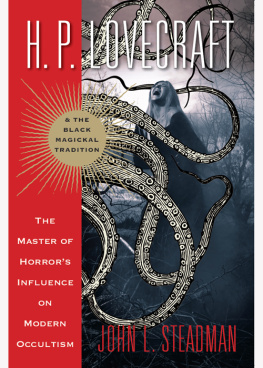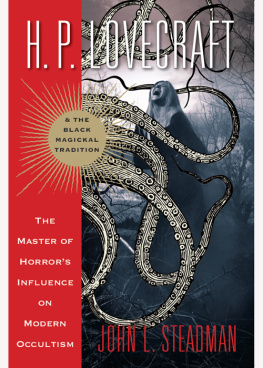Howard Lovecraft - The Very Old Folk
Here you can read online Howard Lovecraft - The Very Old Folk full text of the book (entire story) in english for free. Download pdf and epub, get meaning, cover and reviews about this ebook. genre: Science fiction. Description of the work, (preface) as well as reviews are available. Best literature library LitArk.com created for fans of good reading and offers a wide selection of genres:
Romance novel
Science fiction
Adventure
Detective
Science
History
Home and family
Prose
Art
Politics
Computer
Non-fiction
Religion
Business
Children
Humor
Choose a favorite category and find really read worthwhile books. Enjoy immersion in the world of imagination, feel the emotions of the characters or learn something new for yourself, make an fascinating discovery.

- Book:The Very Old Folk
- Author:
- Genre:
- Rating:3 / 5
- Favourites:Add to favourites
- Your mark:
- 60
- 1
- 2
- 3
- 4
- 5
The Very Old Folk: summary, description and annotation
We offer to read an annotation, description, summary or preface (depends on what the author of the book "The Very Old Folk" wrote himself). If you haven't found the necessary information about the book — write in the comments, we will try to find it.
The Very Old Folk — read online for free the complete book (whole text) full work
Below is the text of the book, divided by pages. System saving the place of the last page read, allows you to conveniently read the book "The Very Old Folk" online for free, without having to search again every time where you left off. Put a bookmark, and you can go to the page where you finished reading at any time.
Font size:
Interval:
Bookmark:
The Very Old Folk
by Howard Phillips Lovecraft
It was a flaming sunset or late afternoon in the tiny provincial town of Pompelo, at the foot of the Pyrenees in Hispania Citerior. The year must have been in the late republic, for the province was still ruled by a senatorial proconsul instead of a prtorian legate of Augustus, and the day was the first before the Kalends of November. The hills rose scarlet and gold to the north of the little town, and the westering sun shone ruddily and mystically on the crude new stone and plaster buildings of the dusty forum and the wooden walls of the circus some distance to the east. Groups of citizens broad-browed Roman colonists and coarse-haired Romanised natives, together with obvious hybrids of the two strains, alike clad in cheap woollen togas and sprinklings of helmeted legionaries and coarse-mantled, black-bearded tribesmen of the circumambient Vascones all thronged the few paved streets and forum; moved by some vague and ill-defined uneasiness.
I myself had just alighted from a litter, which the Illyrian bearers seemed to have brought in some haste from Calagurris, across the Iberus to the southward. It appeared that I was a provincial qustor named L. Clius Rufus, and that I had been summoned by the proconsul, P. Scribonius Libo, who had come from Tarraco some days before. The soldiers were the fifth cohort of the XIIth legion, under the military tribune Sex. Asellius; and the legatus of the whole region, Cn. Balbutius, had also come from Calagurris, where the permanent station was.
The cause of the conference was a horror that brooded on the hills. All the townsfolk were frightened, and had begged the presence of a cohort from Calagurris. It was the Terrible Season of the autumn, and the wild people in the mountains were preparing for the frightful ceremonies which only rumour told of in the towns. They were the very old folk who dwelt higher up in the hills and spoke a choppy language which the Vascones could not understand. One seldom saw them; but a few times a year they sent down little yellow, squint-eyed messengers (who looked like Scythians) to trade with the merchants by means of gestures, and every spring and autumn they held the infamous rites on the peaks, their howlings and altar-fires throwing terror into the villages. Always the same the night before the Kalends of Maius and the night before the Kalends of November. Townsfolk would disappear just before these nights, and would never be heard of again. And there were whispers that the native shepherds and farmers were not ill-disposed toward the very old folk that more than one thatched hut was vacant before midnight on the two hideous Sabbaths.
This year the horror was very great, for the people knew that the wrath of the very old folk was upon Pompelo. Three months previously five of the little squint-eyed traders had come down from the hills, and in a market brawl three of them had been killed. The remaining two had gone back wordlessly to their mountains and this autumn not a single villager had disappeared. There was menace in this immunity. It was not like the very old folk to spare their victims at the Sabbath. It was too good to be normal, and the villagers were afraid.
For many nights there had been a hollow drumming on the hills, and at last the dile Tib. Annus Stilpo (half native in blood) had sent to Balbutius at Calagurris for a cohort to stamp out the Sabbath on the terrible night. Balbutius had carelessly refused, on the ground that the villagers' fears were empty, and that the loathsome rites of hill folk were of no concern to the Roman People unless our own citizens were menaced.
I, however, who seemed to be a close friend of Balbutius, had disagreed with him; averring that I had studied deeply in the black forbidden lore, and that I believed the very old folk capable of visiting almost any nameless doom upon the town, which after all was a Roman settlement and contained a great number of our citizens. The complaining dile's own mother Helvia was a pure Roman, the daughter of M. Helvius Cinna, who had come over with Scipio's army. Accordingly I had sent a slave a nimble little Greek called Antipater to the proconsul with letters, and Scribonius had heeded my plea and ordered Balbutius to send his fifth cohort, under Asellius, to Pompelo; entering the hills at dusk on the eve of November's Kalends and stamping out whatever nameless orgies he might find bringing such prisoners as he might take to Tarraco for the next proprtor's court. Balbutius, however, had protested, so that more correspondence had ensued. I had written so much to the proconsul that he had become gravely interested, and had resolved to make a personal inquiry into the horror.
He had at length proceeded to Pompelo with his lictors and attendants; there hearing enough rumours to be greatly impressed and disturbed, and standing firmly by his order for the Sabbath's extirpation. Desirous of conferring with one who had studied the subject, he ordered me to accompany Asellius' cohort and Balbutius had also come along to press his adverse advice, for he honestly believed that drastic military action would stir up a dangerous sentiment of unrest amongst the Vascones both tribal and settled.
So here we all were in the mystic sunset of the autumn hills old Scribonius Libo in his toga prtexta, the golden light glancing on his shiny bald head and wrinkled hawk face, Balbutius with his gleaming helmet and breastplate, blue-shaven lips compressed in conscientiously dogged opposition, young Asellius with his polished greaves and superior sneer, and the curious throng of townsfolk, legionaries, tribesmen, peasants, lictors, slaves, and attendants. I myself seemed to wear a common toga, and to have no especially distinguishing characteristic. And everywhere horror brooded. The town and country folk scarcely dared speak aloud, and the men of Libo's entourage, who had been there nearly a week, seemed to have caught something of the nameless dread. Old Scribonius himself looked very grave, and the sharp voices of us later comers seemed to hold something of curious inappropriateness, as in a place of death or the temple of some mystic God.
We entered the prtorium and held grave converse. Balbutius pressed his objections, and was sustained by Asellius, who appeared to hold all the natives in extreme contempt while at the same time deeming it inadvisable to excite them. Both soldiers maintained that we could better afford to antagonise the minority of colonists and civilised natives by inaction, than to antagonise a probable majority of tribesmen and cottagers by stamping out the dread rites.
I, on the other hand, renewed my demand for action, and offered to accompany the cohort on any expedition it might undertake. I pointed out that the barbarous Vascones were at best turbulent and uncertain, so that skirmishes with them were inevitable sooner or later whichever course we might take; that they had not in the past proved dangerous adversaries to our legions, and that it would ill become the representatives of the Roman People to suffer barbarians to interfere with a course which the justice and prestige of the Republic demanded. That, on the other hand, the successful administration of a province depended primarily upon the safety and good-will of the civilized element in whose hands the local machinery of commerce and prosperity reposed, and in whose veins a large mixture of our own Italian blood coursed. These, though in numbers they might form a minority, were the stable element whose constancy might be relied on, and whose cooperation would most firmly bind the province to the Imperium of the Senate and the Roman People.
It was at once a duty and an advantage to afford them the protection due to Roman citizens; even (and here I shot a sarcastic look at Balbutius and Asellius) at the expense of a little trouble and activity, and of a slight interruption of the draught-playing and cock-fighting at the camp in Calagurris. That the danger to the town and inhabitants of Pompelo was a real one, I could not from my studies doubt. I had read many scrolls out of Syria and gyptus, and the cryptic towns of Etruria , and had talked at length with the bloodthirsty priest of Diana Aricina in his temple in the woods bordering Lacus Nemorensis.
Font size:
Interval:
Bookmark:
Similar books «The Very Old Folk»
Look at similar books to The Very Old Folk. We have selected literature similar in name and meaning in the hope of providing readers with more options to find new, interesting, not yet read works.
Discussion, reviews of the book The Very Old Folk and just readers' own opinions. Leave your comments, write what you think about the work, its meaning or the main characters. Specify what exactly you liked and what you didn't like, and why you think so.



